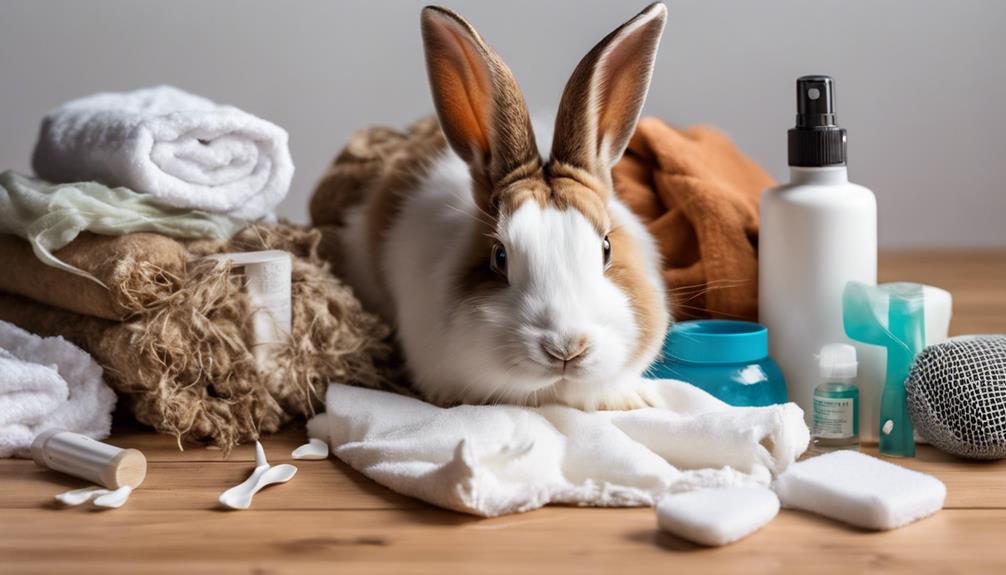Top 10 Remedies for Rabbit Allergies
If you're dealing with rabbit allergies, start by trying antihistamines for symptom relief. Consider using air purifiers with HEPA filters to remove dander from your home. Invest in allergy-proof bedding and wash it frequently to minimize allergens. Nasal sprays like saline and steroid can help care for your nasal passages. Immunotherapy may desensitize your immune system to allergens over time. Try steam therapy using herbal remedies for daily relief. Groom your pets regularly to reduce dander. Consult an allergist for testing and personalized treatment plans. Adjusting your home environment can also help minimize allergen exposure.
Antihistamines
If you suffer from rabbit allergies, antihistamines can provide relief from symptoms such as sneezing and itching. Allergy-friendly diets and lifestyle changes can also help manage these allergies. When it comes to alternative treatments and natural remedies, some people find relief through these methods as well.
Antihistamines work by blocking histamine, a substance released by the immune system during an allergic reaction. They can help alleviate symptoms like sneezing, itching, and runny nose that occur when exposed to allergens like rabbit dander. These medications are available over-the-counter or by prescription, with different types such as loratadine, cetirizine, and fexofenadine.
In addition to taking antihistamines, making changes to your lifestyle and diet can also be beneficial in managing rabbit allergies. Maintaining a clean environment by regularly vacuuming and dusting can help reduce exposure to allergens. Using allergen-proof bedding and air filters can also minimize symptoms. Some individuals may find relief by following an allergy-friendly diet that focuses on whole foods and avoids common allergens.
For those interested in alternative treatments and natural remedies, options like saline nasal rinses, steam inhalation, and herbal supplements may provide some relief. However, it's essential to consult with a healthcare provider before trying these methods to ensure they're safe and effective for your specific situation.
Air Purifiers
When managing rabbit allergies, incorporating air purifiers into your living space can help minimize exposure to allergens like rabbit dander, providing relief from symptoms such as sneezing and itching. Air purifiers work by filtering out airborne particles, including pet dander, pollen, and dust, creating a cleaner environment for you to breathe in.
Here are some essential tips to make the most of air purifiers in combatting rabbit allergies:
- Choose a High-Efficiency Particulate Air (HEPA) Filter: Opt for an air purifier with a HEPA filter, as it can capture smaller particles like rabbit dander effectively.
- Regular Pet Grooming: Brush and bathe your rabbit regularly to reduce the amount of dander they shed into the air.
- Place Air Purifiers Strategically: Position air purifiers in rooms where you and your rabbit spend the most time to ensure maximum efficiency.
- Avoid Scented Air Purifiers: Fragrances can trigger allergies in some individuals, so opt for unscented air purifiers.
- Consider Indoor Plants: Certain indoor plants like the spider plant or aloe vera can help improve air quality by absorbing pollutants, complementing the work of air purifiers.
Allergy-Proof Bedding
To minimize exposure to allergens like rabbit dander and improve your sleep quality, consider investing in allergy-proof bedding designed to block out microscopic particles that can trigger allergic reactions.
When it comes to bedding alternatives for individuals with rabbit allergies, opting for allergy-friendly fabrics can make a significant difference in reducing symptoms. Look for bedding made from materials such as hypoallergenic cotton, microfiber, or tightly woven fabrics that act as a barrier against allergens.
Hypoallergenic cotton bedding is a popular choice as it's soft, breathable, and less likely to harbor allergens compared to traditional bedding materials. Microfiber bedding is another excellent option, known for its tightly woven fibers that prevent dust mites, pollen, and rabbit dander from accumulating. Additionally, consider encasing your pillows, mattress, and box spring in allergen-proof covers to create a protective shield against allergens.
When selecting allergy-proof bedding, prioritize materials that are easy to wash frequently in hot water to kill any allergens present. Remember to vacuum your mattress and pillows regularly to remove any trapped allergens.
Nasal Sprays
Consider incorporating nasal sprays into your routine to alleviate symptoms associated with rabbit allergies, offering targeted relief for nasal congestion and irritation caused by exposure to allergens. Nasal sprays can help reduce inflammation, clear nasal passages, and provide relief from symptoms without the drowsiness often associated with oral medications.
Here are some key points to consider when using nasal sprays for rabbit allergies:
- Saline Nasal Sprays: These natural remedies can help moisturize nasal passages and wash away allergens, providing relief from congestion and irritation.
- Steroid Nasal Sprays: These prescription or over-the-counter alternative treatments can reduce inflammation in the nasal passages, alleviating symptoms like congestion, sneezing, and itching.
- Antihistamine Nasal Sprays: Offering targeted relief, these sprays work by blocking histamine, a chemical released during allergic reactions, helping to alleviate symptoms like sneezing and itching.
- Decongestant Nasal Sprays: These sprays can provide quick but temporary relief from nasal congestion by shrinking swollen blood vessels in the nasal passages.
- Natural Essential Oil Nasal Sprays: Some people find relief from rabbit allergies using essential oil-based nasal sprays, which may have soothing properties and help reduce inflammation.
HEPA Filters
Incorporate HEPA filters into your living space to reduce airborne allergens and improve air quality, providing relief from rabbit allergies. High-Efficiency Particulate Air (HEPA) filters are designed to trap small particles like pet dander, dust mites, and pollen, making them an excellent addition to your allergy management plan.
HEPA filters work by forcing air through a fine mesh that captures harmful particles, preventing them from circulating in your home. To maximize the effectiveness of HEPA filters, ensure proper filter maintenance by replacing them according to the manufacturer's instructions. Regular filter changes prevent clogging and ensure that the filters can continue to capture allergens efficiently.
By using HEPA filters, you can significantly reduce the amount of airborne allergens in your living space, providing relief from symptoms like sneezing, coughing, and watery eyes caused by rabbit allergies. These filters are especially beneficial in homes with rabbits, as they help control dust and dander that can exacerbate allergies.
In addition to filter maintenance, consider implementing other dust control measures like regular vacuuming, washing bedding frequently, and keeping your rabbit's living area clean. By combining HEPA filters with these practices, you can create a healthier indoor environment and alleviate the impact of rabbit allergies on your daily life.
Saline Nasal Rinse
Enhance your rabbit allergy management by incorporating a saline nasal rinse into your daily routine. This simple yet effective method can help alleviate nasal congestion and reduce the symptoms associated with rabbit allergies. Here are some key points to consider when using saline nasal rinses as part of your allergy management plan:
- Regular Usage: Consistent use of saline nasal rinses can help flush out allergens from your nasal passages, providing relief from congestion and irritation.
- Hygiene: Ensure proper cleaning of the nasal rinse device to prevent the introduction of harmful bacteria into your nasal passages.
- Warm Saline Solution: Using a warm saline solution can help soothe the nasal passages and improve the effectiveness of the rinse.
- Frequency: Depending on your allergy severity, using a saline nasal rinse once or twice a day can help maintain clear nasal passages.
- Compatibility with Medications: Saline nasal rinses are generally safe to use alongside other allergy medications. However, consult with your healthcare provider to ensure compatibility with your current treatment plan.
In addition to saline nasal rinses, adopting a rabbit-friendly diet rich in anti-inflammatory foods and incorporating natural remedies such as herbal teas or steam inhalation can further complement your allergy management efforts. Remember, consistency is key when using these remedies to effectively manage your rabbit allergies.
Immunotherapy

Immunotherapy involves exposing you to gradually increasing doses of the allergen to build tolerance and reduce your allergic reactions over time. Allergy shots, a common form of immunotherapy, work by introducing small amounts of the allergen into your body, aiming to desensitize your immune system. This process can lead to a decrease in the severity of your allergic responses to rabbit allergens.
Effectiveness of allergy shots varies among individuals. Some may experience significant relief from symptoms, while others might see only a slight improvement. It's essential to consult with an allergist to determine if immunotherapy is the right option for you. The treatment duration can also vary, with some individuals requiring shots for several years to achieve lasting benefits.
When considering immunotherapy, one significant factor to take into account is the cost. Immunotherapy can be expensive, as it involves regular visits to the allergist's office for administration of the shots. Additionally, insurance coverage for this treatment can vary, so it's crucial to check with your provider to understand the costs involved.
Despite the potential effectiveness of immunotherapy for rabbit allergies, it's important to weigh the benefits against the cost and time commitment required. Consulting with a healthcare professional can help you make an informed decision regarding this treatment option.
Steam Therapy
If you're seeking alternative remedies for managing rabbit allergies, consider exploring the potential benefits of steam therapy in alleviating your symptoms. Steam therapy, a form of alternative medicine, can help relieve nasal congestion and other allergy symptoms.
Here are some key points to consider:
- Herbal Remedies: Adding a few drops of essential oils such as eucalyptus, peppermint, or tea tree oil to the steam can enhance its therapeutic effects.
- DIY Steam Therapy: You can easily create a DIY steam therapy setup at home by boiling water in a pot or using a facial steamer.
- At Home Remedies: Steam therapy is a convenient at-home remedy that can be incorporated into your daily routine to provide relief from rabbit allergy symptoms.
- Moisturizing Effects: Inhaling steam can help moisturize and soothe irritated nasal passages, reducing inflammation caused by exposure to rabbit dander.
- Sinus Relief: Steam therapy can aid in clearing your sinuses, promoting easier breathing and alleviating discomfort associated with rabbit allergies.
Eliminate Dander

To effectively manage rabbit allergies, one crucial step is to implement measures to eliminate dander from your living environment. Rabbit dander consists of tiny, microscopic particles of skin that can trigger allergic reactions in sensitive individuals. One effective way to reduce shedding and dander in your home is through regular grooming practices for your rabbit. Brushing your rabbit frequently can help remove loose fur and dander before it has a chance to circulate in the air and settle on surfaces.
When grooming your rabbit, opt for a brush that's specifically designed to capture loose fur and dander. Look for grooming tools with soft bristles that can reach deep into your rabbit's coat without causing any discomfort. Regular grooming not only helps to reduce shedding and dander but also promotes a healthy coat and skin for your furry friend.
In addition to grooming, maintaining a clean living environment is essential for minimizing dander exposure. Vacuum your home regularly using a vacuum cleaner equipped with a HEPA filter to trap tiny dander particles. Wash your rabbit's bedding frequently and consider using air purifiers to help remove airborne allergens. By incorporating these grooming practices and cleanliness habits into your routine, you can effectively reduce rabbit dander in your home and alleviate allergy symptoms.
Consult an Allergist
Consider scheduling a consultation with an allergist to determine the best course of action for managing your rabbit allergies. An allergist specializes in identifying specific allergens that trigger reactions in individuals, including rabbit dander. By seeking professional help, you can receive personalized advice tailored to your specific situation.
Here are some key points to keep in mind when consulting an allergist:
- Allergy Testing: The allergist can conduct tests to determine if you're allergic to rabbits or other allergens, helping you understand the root cause of your symptoms.
- Medication Options: Allergists can prescribe medications such as antihistamines or nasal sprays to help alleviate allergy symptoms.
- Immunotherapy: If necessary, allergists can recommend immunotherapy treatments to help desensitize your body to rabbit allergens over time.
- Pet Friendly Alternatives: Explore alternative pets that are hypoallergenic or produce less dander to reduce allergic reactions.
- Home Environment Adjustments: Allergists can provide guidance on adjusting your home environment to minimize exposure to rabbit dander, such as using air purifiers or frequent cleaning routines.
Frequently Asked Questions
Can Certain Foods Trigger Rabbit Allergies?
Certain foods can trigger rabbit allergies due to cross-reactivity. This means that proteins in certain foods may resemble rabbit allergens, causing a similar immune response. Common dietary triggers for rabbit allergies include fruits like apples, cherries, and peaches, as well as vegetables like carrots and celery.
If you suspect a food allergy is exacerbating your rabbit allergy symptoms, consult with an allergist for proper diagnosis and guidance on managing your diet.
Are There Specific Breeds That Are Hypoallergenic?
When looking for allergy-friendly breeds, consider hypoallergenic rabbits like the Rex, Mini Rex, or Mini Lop. These breeds produce less dander, reducing the risk of triggering allergies.
Regular grooming is key to managing allergens – brush your rabbit frequently to remove loose fur and dander. Additionally, ensure their living space is clean and well-ventilated to minimize allergen buildup.
These grooming techniques can help you enjoy your rabbit without suffering from allergies.
How Long Does It Take to See Results From Immunotherapy?
When undergoing immunotherapy for rabbit allergies, the effectiveness timeline can vary from person to person. Some individuals may start experiencing improvements within a few months, while others might take up to a year or longer to see significant results.
Patient experiences with immunotherapy also differ, with some reporting gradual relief and others noticing more immediate benefits.
It's important to consult with your healthcare provider to understand what to expect based on your specific situation.
Can Rabbit Allergies Worsen Over Time?
If left untreated, rabbit allergies can worsen over time due to continuous exposure to allergens. Environmental changes like removing rabbits from your living space may provide relief.
Allergy testing can identify specific triggers, guiding treatment options. Long term effects of untreated allergies can lead to chronic symptoms and respiratory issues.
It's crucial to address the allergies promptly to prevent exacerbation of symptoms and potential complications down the line.
Is It Safe for Pregnant Women to Have Rabbits if Allergic?
During pregnancy, having rabbits when allergic can pose risks due to potential allergic reactions. It's vital for expecting mothers to manage allergies carefully around rabbits to prevent complications.
Allergy symptoms may worsen during pregnancy, affecting both you and the baby. Consult with your healthcare provider for guidance on safe practices and potential solutions to minimize allergy triggers.
Prioritize your health and your baby's well-being when considering keeping rabbits while pregnant.
Conclusion
In conclusion, managing rabbit allergies requires a combination of remedies such as:
- Antihistamines
- Air purifiers
- Allergy-proof bedding
- Nasal sprays
- HEPA filters
- Immunotherapy
- Steam therapy
- Eliminating dander
Consultation with an allergist is essential for personalized treatment plans. By implementing these top 10 remedies, individuals can effectively reduce their allergy symptoms and enjoy a healthier relationship with their beloved pet rabbits.
